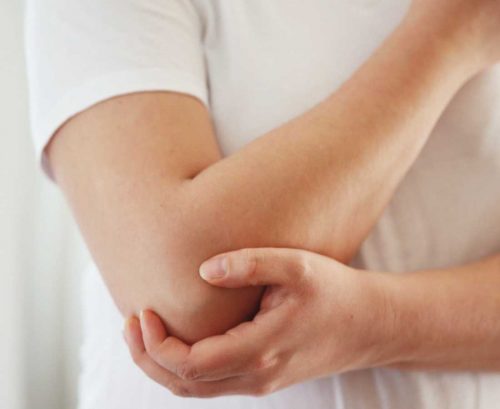
Psoriasis is a common skin disease — but its knock-on health effects can be anything but skin deep. Health reporter Karen Fittall investigates the role diet can play.
Psoriasis is a common skin condition that results in inflamed, thickened and scaly areas of skin. At least 80 per cent of people living with the condition try to hide it from others, often due to fear of being stigmatised. But, while the psychological effects of psoriasis are well recognised, it’s not the only complicating factor the skin disease brings.
It affects the nails, and one in four people with psoriasis will develop arthritis. Research shows that having psoriasis also bumps up the odds of developing diabetes and heart disease. It’s partly because they’re diseases that share some of the same risk factors as these conditions, but also because psoriasis can result in chronic inflammation, which increases the likelihood of certain diseases and health problems over time. In fact, according to updated statistics published late last year, chronic inflammation is to blame for three out of every five deaths worldwide.
So, if you’re living with psoriasis, can something as simple as a few tweaks to what you eat help your skin and also help protect against the heart disease, diabetes and arthritis it’s been linked to? The answer might surprise you.
Psoriasis explained
Not entirely sure what psoriasis is, what causes it, or whether you can ‘catch’ it? Here’s what you need to know.
Three common symptoms
Even though there are different types of psoriasis, the three most prevalent symptoms are scaling of the skin, itching and skin redness.
There’s more than one variety
Nine out of 10 people who have psoriasis have ‘plaque psoriasis’, but there are at least six other types that can affect different parts of the body.
It’s not contagious
The exact cause of psoriasis remains unknown, but experts agree there’s a genetic link. It develops in people who have an inherited tendency for their skin’s immune system to react abnormally to certain environmental ‘triggers’.
It’s not curable
True, but it can be controlled — and sometimes completely controlled — with treatment.
Can diet help psoriasis?
What you eat — and don’t eat — can affect your psoriasis, for better or worse. A recent study confirmed that when people with psoriasis who were overweight lost some weight, their skin symptoms and their psoriatic arthritis improved significantly. Plus, achieving and maintaining a healthy weight of course helps to lower the risk of diabetes and heart disease.
If you have psoriasis, there are some foods you might want to consider putting on, and leaving off, your plate.
5 diet tweak to help psoriasis
1 Eat as if you live near the Med
- Eat plenty of plant-based foods such as fresh fruit and vegies, nuts, whole grains and legumes
- Be liberal with olive oil
- Eat fish and chicken in moderation
- Go slow on full-fat dairy and red and processed meats
A 2018 study shows that following a Mediterranean diet slows the progression of psoriasis, probably because of the diet’s anti-inflammatory properties. It’s also a heart-healthy diet that’s been proved to help prevent type 2 diabetes.
2 Include plenty of prebiotic foods
Prebiotic foods contain specific types of fibre that pass through the small intestine undigested, becoming food for the good bacteria living in your large intestine. That matters: a 2019 study found people living with psoriasis are prone to ‘dysbiosis’ — an imbalance and lack of diversity in gut bacteria.
Gut health also plays a role in heart disease, type 2 diabetes and how easily you’ll find it to maintain a healthy weight, so eating more prebiotic-rich foods makes sense. The CSIRO says strong evidence now suggests prebiotic foods promote gut health. Good prebiotic choices include garlic, onions, leeks, beetroot, fennel, snow peas, sweetcorn and legumes.
3 Think about gluten
How do you feel after you’ve eaten pasta or bread containing gluten? Do you then get any gastrointestinal symptoms such as diarrhoea, cramping or bloating? Research shows having psoriasis means you’re three times more likely to develop coeliac disease, which causes the immune system to react abnormally to gluten.
A review paper found going on a 90-day gluten-free diet was beneficial for some people with psoriasis. Four out of five Australians with coeliac disease are undiagnosed, but because it’s important not to cut gluten out of your diet unnecessarily, talk to your doctor or dietitian first — or visit coeliac.org.au and take the online self-assessment.
4 Limit saturated and trans fats
These fats have a justifiably bad heart health reputation — plus, a new study now also connects a higher intake of saturated and trans fats to more severe psoriasis skin symptoms and psoriatic arthritis. Processed foods such as pies, pastries, cakes, biscuits and deep-fried takeaway foods contain both saturated and trans fats.
5 Limit your alcohol intake
While more research is required, evidence so far points towards a link between drinking too much alcohol and experiencing more severe psoriasis. According to new guidelines from the National Health and Medical Research Council, if you do choose to drink, limit your intake to no more than 10 standard drinks per week — and no more than four standard drinks on any one day.
Article sources and references
- The Australasian College of Dermatologists. 2019. Psoriasis, Accessed November 2020https://www.dermcoll.edu.au/atoz/psoriasis/
- Baker CS et al. 2013. Psoriasis uncovered — measuring burden of disease impact in a survey of Australians with psoriasis. Australas J Dermatol. 54(1): 1-6.https://pubmed.ncbi.nlm.nih.gov/23379483/
- Better Health. 2020. Diet and heart disease risk. Accessed November 2020https://www.betterhealth.vic.gov.au/health/conditionsandtreatments/heart-disease-and-food
- Better Health Channel. 2020. Psoriasis. Accessed November 2020https://www.betterhealth.vic.gov.au/health/ConditionsAndTreatments/psoriasis
- DermNet NZ. 2017. Psychological effects of psoriasis. Accessed November 2020https://dermnetnz.org/topics/psychological-effects-of-psoriasis/#:~:text=Psoriasis%20is%20associated%20with%20a,self%2Dconsciousness%20or%20painful%20lesions
www.healthyfood.com











